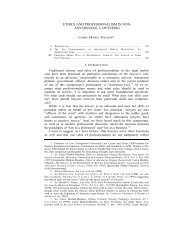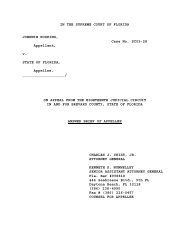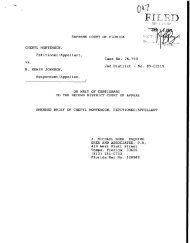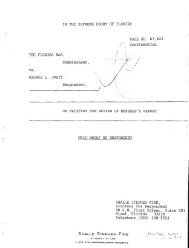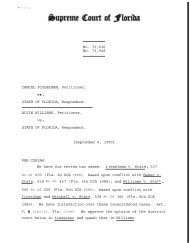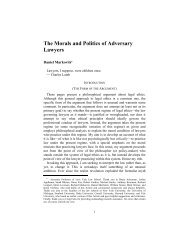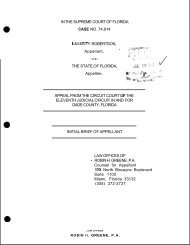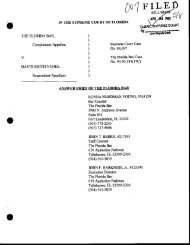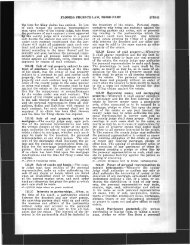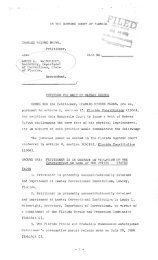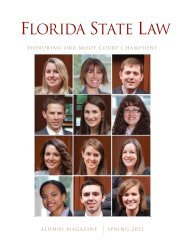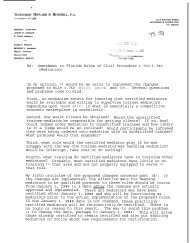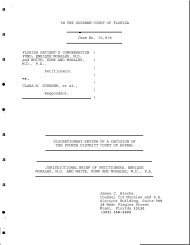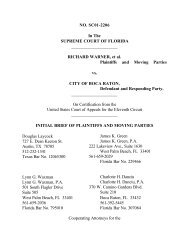Fla. Stat, (1981) - Florida State University College of Law
Fla. Stat, (1981) - Florida State University College of Law
Fla. Stat, (1981) - Florida State University College of Law
You also want an ePaper? Increase the reach of your titles
YUMPU automatically turns print PDFs into web optimized ePapers that Google loves.
The United <strong>Stat</strong>es Supre court has stated the test ta be applied under such<br />
circumstances:<br />
Tt is clear therefore that the special procedural safeguards outlined<br />
in Mirmda are required not where a suspect is simply taken into<br />
custody, but rather where a suspect in custdy is subjected to<br />
interrogation.<br />
l'Interrogation'', as oonceptualized in niranda<br />
opinion, must reflect a measure <strong>of</strong> cqdsion above a n m d<br />
that inherent in custody itself.<br />
We conclude that the Miranda safeguards c m into play whenever<br />
a person in custdy im&d<br />
to either express questioning<br />
or its functional equivalent, mat is to say, the term "interrogation"<br />
under Miranda refers not only to express questioning, but also to<br />
any words or actions on the part <strong>of</strong> the police (other than those<br />
nomlly attendant to arrest and custody) that the police should<br />
knaw are reasonably likely to elicit an incriminating response f m<br />
the suspect. m e Island v. - Innis, 100 S. Ct. 1682, 1689-<br />
90 (1980).<br />
-<br />
The term "incriminating respnse" means any response, inculpatory or exculpt~ry,<br />
that the prosecution may seek to intrduce at trial. Innis, supra, at 1689,<br />
footnote 5.<br />
Here, Detective Bradley did not advise the defendant <strong>of</strong> his rights when<br />
the defendant was arrested, handcuffed, searched,and placed in a patrol car. He<br />
instead walked away and interviewed a witness, then returned and began speaking<br />
to the defendant. He did much mre than sinply advise the defendant he was<br />
under arrest for aggravated assault.<br />
as he believed them to be.<br />
"reasonably likely" to elicit an incriminating response.<br />
He gave the defendant a sum~lry <strong>of</strong> the facts<br />
%is is previsely the sort <strong>of</strong> statemnt that is<br />
confronted by a description <strong>of</strong> the c r h he has been arrested for, will nomlly<br />
be to deny, explain, or adnit one or mre <strong>of</strong> the facts described,<br />
The reaction <strong>of</strong> sawone<br />
advised <strong>of</strong> his rights could the defendant be expected to make an intelligent<br />
decision as to whether to respond to the allegations made by the detective,<br />
Without being told that any response will be used against him, the average<br />
Only after being<br />
citizen would feel corrrpelled to give sane respnse.<br />
A similar interrogation tactic was utilized by a &ice <strong>of</strong>ficer in - Jon&<br />
-<br />
v. <strong>Stat</strong>e, 346 So. 2d 639 (<strong>Fla</strong>, 2nd D,C.A. 1977).<br />
In J?n?s, the defendant,<br />
after being'advised <strong>of</strong> his rights, asked to talk to his attorney. The <strong>of</strong>ficer



